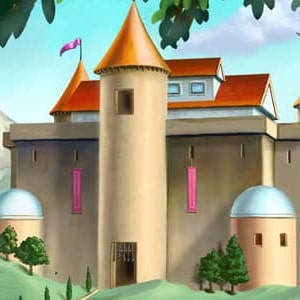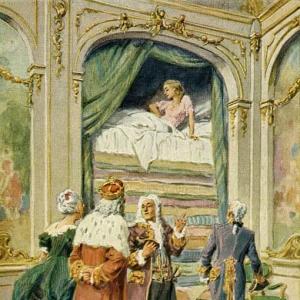Reading time: 26 min
Attention: This is a scary story.
There was, once upon a time, a man and his wife, faggot-makers by trade, who had seven children, all boys. The eldest was but ten years old, and the youngest only seven. One might wonder how that the faggot-maker could have so many children in so little a time; but it was because his wife went nimbly about her business and never brought fewer than two at a birth.
They were very poor, and their seven children incommoded them greatly, because not one of them was able to earn his bread. That which gave them yet more uneasiness was, that the youngest was of a very puny constitution, and scarce ever spake a word, which made them take that for stupidity which was a sign of good sense. He was very little, and, when born, no bigger than one’s thumb; which made him be called Little Thumb.
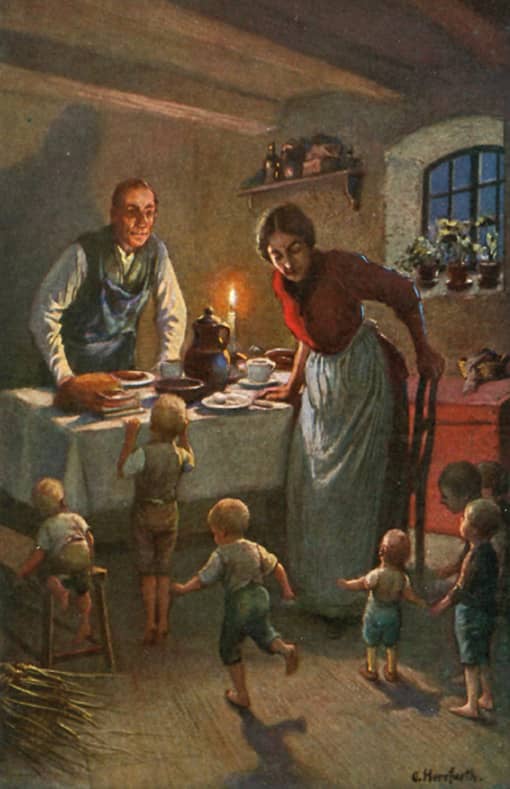
The poor child bore the blame of whatsoever was done amiss in the house, and guilty or not was always in the wrong. He was, notwithstanding, more cunning and had a far greater share of wisdom than all his brothers put together, and if he spake little he heard and thought the more. There happened now to come a very bad year, and the famine was so great, that these poor people resolved to rid themselves of their children. One evening, when they were all in bed and the faggot-maker was sitting with his wife at the fire, he said to her, with his heart ready to burst with grief:
„Thou see’st plainly that we are not able to keep our children, and I cannot see them starve to death before my face. I am resolved to lose them in the wood to-morrow, which may very easily be done. For while they are busy in tying up the faggots, we may run away, and leave them, without their taking any notice.“ – „Ah!“ cried out his wife, „and can’st thou thyself have the heart to take thy children out along with thee on purpose to lose them?“
In vain did her husband represent to her their extreme poverty. She would not consent to it. She was, indeed poor, but she was their mother. However, having considered what a grief it would be to her to see them perish with hunger, she at last consented and went to bed all in tears. Little Thumb heard every word that had been spoken. For observing, as he lay in his bed, that they were talking very busily, he had got up softly and hid himself under his father’s stool, that he might hear what they said, without being seen. He went to bed again, but did not sleep a wink all the rest of the night, thinking on what he ought to do.
He got up early in the morning, and went to the river side, where he filled his pockets full of small white pebbles, and then returned home. They all went abroad, but Little Thumb never told his brothers one syllable of what he knew. They went into a very thick forest, where they could not see one another at ten paces distance. The faggot-maker began to cut wood, and the children to gather up sticks to make faggots. Their father and mother seeing them busy at their work, got from them by degrees, and then ran away from them all at once, along a by-way, thro‘ the winding bushes.
When the children saw they were left alone, they began to cry as loud as they could. Little Thumb let them cry on, knowing very well how to go home again. For as he came he had taken care to drop all along the way the little white pebbles he had in his pockets. Then said he to them: „Be not afraid, brothers, father and mother have left us here, but I will lead you home again, only follow me.“ They did so, and he brought them home by the very same way they came into the forest. They dared not to go in, but sat themselves down at the door, listening to what their father and mother were saying. The very moment the faggot-maker and his wife were got home, the lord of the manor sent them ten crowns, which he had owed them a long while, and which they never expected.
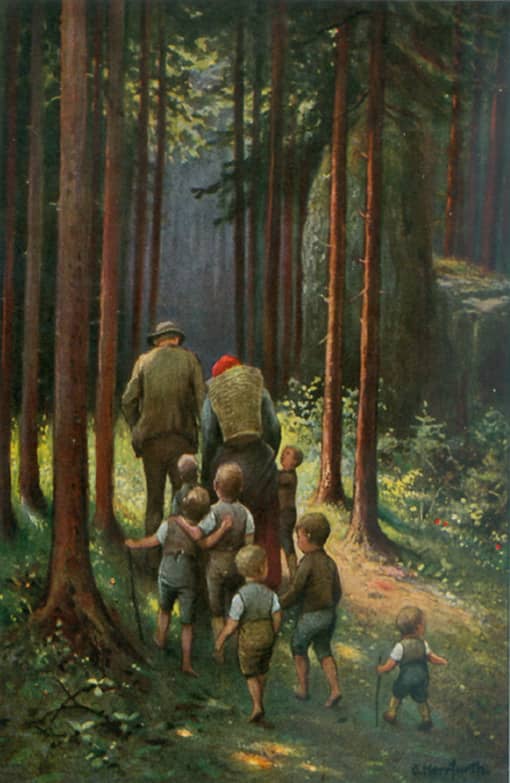
This gave them new life. For the poor people were almost famished. The faggot-maker sent his wife immediately to the butcher’s. As it was a long while since they had eaten a bit, she bought thrice as much meat as would sup two people. Having filled their bellies, the woman said: „Alas! where are now our poor children? They would make a good feast of what we have left here; but then it was you, William, who had a mind to lose them. I told you we should repent of it: what are they now doing in the forest? Alas! dear God, the wolves have, perhaps, already eaten them up: thou art very inhuman thus to have lost thy children.“
The faggot-maker grew at last quite out of patience, for she repeated this above twenty times, that they should repent of it, and she was in the right of it for so saying. He threatened to beat her, if she did not hold her tongue. It was not that the faggot-maker was not, perhaps, more vexed than his wife, but that she teized him, and that he was of the humour of a great many others, who love wives who speak right, but think those very importunate who are always in the right. She was half drowned in tears, crying out:
„Alas! where are now my children, my poor children?“ She spake this so very loud, that the children who were at the door, began to cry out all together: „Here we are, here we are.“ She ran immediately to open the door, and said, hugging them: „I am glad to see you, my dear children. You are very hungry and weary; and my poor Peter, thou art horribly bemired; come in and let me clean thee.“
Now, you must know, that Peter was her eldest son, whom she loved above all the rest, because he was somewhat carrotty, as she herself was. They sat down to supper, and ate with such a good appetite as pleased both father and mother, whom they acquainted how frightened they were in the forest; speaking almost always all together. The good folks were extremely glad to see their children once more at home, and this joy continued while the ten crowns lasted; but when the money was all gone, they fell again into their former uneasiness, and resolved to lose them again; and, that they might be the surer of doing it, to carry them at a much greater distance than before.
They could not talk of this so secretly, but they were overheard by Little Thumb, who made account to get out of this difficulty as well as the former; but though he got up betimes in the morning, to go and pick up some little pebbles, he was disappointed. For he found the housedoor double-locked, and was at a stand what to do. When their father had given each of them a piece of bread for their breakfast, he fancied he might make use of this bread instead of the pebbles, by throwing it in little bits all along the way they should pass; and so he put it up into his pocket.
Their father and mother brought them into the thickest and most obscure part of the forest; when, stealing away into a by-path, they there left them. Little Thumb was not very uneasy at it. For he thought he could easily find the way again, by means of his bread which he had scattered all along as he came. But he was very much surprised when he could not find so much as one crumb. The birds had come and eaten it up every bit. They were now in great affliction, for the farther they went, the more they were out of their way, and were more and more bewildered in the forest.
Night now came on, and there arose a terrible high wind, which made them dreadfully afraid. They fancied they heard on every side of them the houling of wolves coming to eat them up. They scarce dared to speak, or turn their heads. After this, it rained very hard, which wet them to the skin. Their feet slipped at every step they took, and they fell into the mire, whence they got up in a very dirty pickle. Their hands were in a sorry state.
Little Thumb climbed up to the top of a tree, to see if he could discover any thing; and having turned his head about on every side, he saw at last a glimmering light, like that of a candle, but a long way from the forest. He came down, and, when upon the ground, he could see it no more, which grieved him sadly. However, having walked for some time with his brothers towards that side on which he had seen the light, he perceived it again as he came out of the wood.
They came at last to the house where this candle was, not without abundance of fear. For very often they lost sight of it, which happened every time they came into a bottom. They knocked at the door, and a good woman came and open’d it. She asked them what they wished. Little Thumb told her they were poor children who had been lost in the forest, and desired to lodge there for God’s sake. The woman seeing them so very pretty, began to weep, and said to them: „Alas! poor babies, whither are ye come? Do ye know that this house belongs to a cruel Ogre, who eats up little children?“
„Ah! dear Madam,“ answered Little Thumb (who trembled every joint of him, as well as his brothers) „what shall we do? To be sure, the wolves of the forest will devour us to-night, if you refuse us to lie here; and so, we would rather the gentleman should eat us. Perhaps he will take pity on us, especially if you please to beg it of him.“ The Ogre’s wife, who believed she could conceal them from her husband till morning, let them come in, and brought them to warm themselves at a very good fire. For there was a whole sheep upon the spit roasting for the Ogre’s supper.
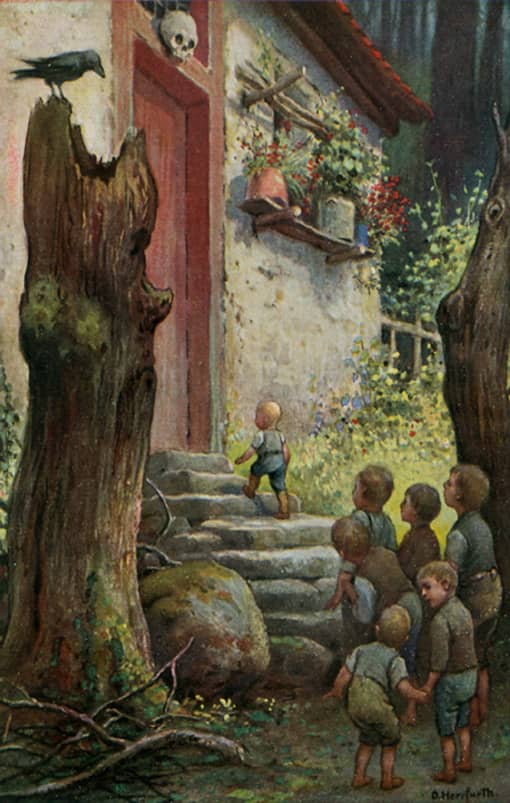
As they began to be a little warm, they heard three or four great raps at the door. This was the Ogre, who was come home. Upon this she hid them under the bed, and went to open the door. The Ogre presently asked if supper was ready, and the wine drawn; and then he sat himself down to table. The sheep was as yet all raw and bloody; but he liked it the better for that. He sniffed about to the right and left, saying, „I smell fresh meat.“
„What you smell so,“ said his wife, „must be the calf which I have just now killed and flayed.“ – „I smell fresh meat, I tell thee once more,“ replied the Ogre, looking crossly at his wife, „and there is something here which I do not understand.“ As he spake these words, he got up from the table, and went directly to the bed. „Ah!“ said he, „I see how thou would’st cheat me, thou cursed woman. I know not why I do not eat up thee too; but it is well for thee that thou art a tough old carrion. Here is good game, which comes very luckily to entertain three Ogres of my acquaintance, who are to pay me a visit in a day or two.“
With that he dragged them out from under the bed one by one. The poor children fell upon their knees, and begged his pardon; but they had to do with one of the most cruel Ogres in the world, who, far from having any pity on them, had already devoured them with his eyes. He told his wife they would be delicate eating, when tossed up with good savoury sauce. He then took a great knife, and coming up to these poor children, whetted it upon a great whet-stone which he held in his left hand. He had already taken hold of one of them, when his wife said to him:
„What need you do it now? It is time enough tomorrow?“
„Hold your prattling,“ said the Ogre, „they will eat the tenderer.“
„But you have so much meat already,“ replied his wife, „you have no occasion. Here is a calf, two sheep, and half a hog.“
„That is true,“ said the Ogre, „give them their bellyfull, that they may not fall away, and put them to bed.“
The good woman was overjoyed at this, and gave them a good supper; but they were so much afraid, they could not eat a bit. As for the Ogre, he sat down again to drink, being highly pleased that he had got wherewithal to treat his friends. He drank a dozen glasses more than ordinary, which got up into his head, and obliged him to go to bed. The Ogre had seven daughters, all little children, and these young Ogresses had all of them very fine complexions, because they used to eat fresh meat like their father.
But they had little grey eyes, quite round, hooked noses, wide mouths, and very long sharp teeth standing at a good distance from each other. They were not as yet over and above mischievous; but they promised very fair for it, for they already bit little children, that they might suck their blood. They had been put to bed early, with every one ‚a crown of gold upon her head. There was in the same chamber another bed of the like bigness, and it was into this bed the Ogre’s wife put the seven little boys; after which she went to bed to her husband.
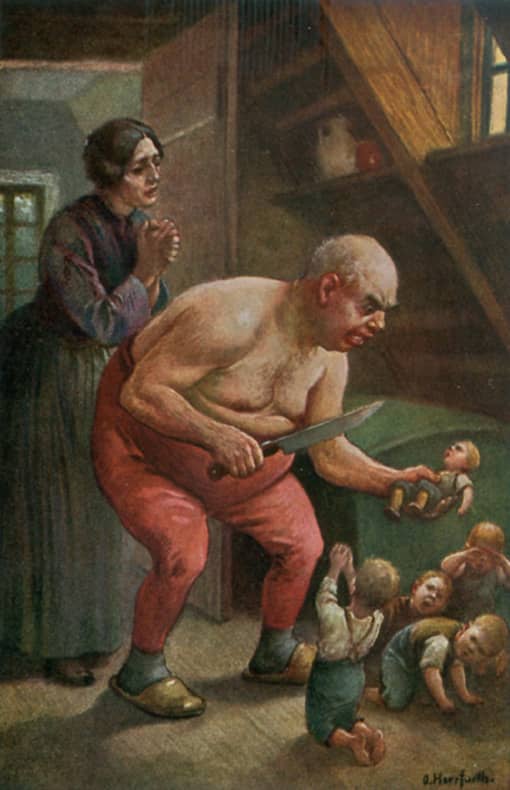
Little Thumb, who had observed that the Ogre’s daughters had crowns of gold upon their heads, and was afraid lest the Ogre should repent his not killing them, got up about midnight; and taking his brothers‘ bonnets and his own, went very softly, put them upon the heads of the seven little Ogresses, after having taken off their crowns of gold, which he put upon his own head and his brothers‘, that the Ogre might take them for his daughters, and his daughters for the little boys whom he wanted to kill.
All this succeeded according to his desire. For the Ogre waking about midnight, and sorry that he deferred to do that till morning which he might have done over-night, threw himself hastily out of bed, and taking his great knife: „Let us see,“ said he, „how our little rogues do, and not make two jobs of the matter.“ He then went up, groping all the way, into his daughters‘ chamber; and came to the bed where the little boys lay, who were every soul of them fast asleep; except Little Thumb, who was terribly afraid when he found the Ogre fumbling about his head, as he had done about his brothers. The Ogre, feeling the golden crowns, said:
„I should have made a fine piece of work of it truly. I find I guzzled too much last night.“ Then he went to the bed where the girls lay; and having found the boys‘ little bonnets: „Hah!“ said he, „my merry lads, are you there? Let us to work!“ And saying these words, without more ado, he cut the throats of all his seven daughters. Well pleased with what he had done, he went to bed again to his wife. So soon as Little Thumb heard the Ogre snore, he waked his brothers, and bade them put on their clothes presently, and follow him.
They stole down softly into the garden, and got over the wall. They kept running almost all night, trembling all the while, without knowing which way they went. The Ogre, when he waked, said to his wife: „Go up stairs and dress those young rascals who came here last night.“ The Ogress was very much surprised at this goodness of her husband, not dreaming after what manner he intended she should dress them; but thinking that he had ordered her to go and put on their cloaths, went up, and was strangely astonished when she perceived her seven daughters killed, and weltering in their blood.
She fainted away. For this is the first expedient almost all women find in such-like cases. The Ogre, fearing his wife would be too long in doing what he had ordered, went up himself to help her. He was no less amazed than his wife, at this frightful spectacle. „Ah! what have I done?“ cried he. „The cursed wretches shall pay for it, and that instantly.“ He threw then a pitcher of water upon his wife’s face; and having brought her to herself: „Give me quickly,“ cried he, „my boots of seven leagues, that I may go and catch them.“
He went out; and, having run over a vast deal of ground, both on this side and that, he came at last into the very road where the poor children were, and not above a hundred paces from their father’s house. They espied the Ogre, who went at one step from mountain to mountain, and over rivers as easily as the narrowest kennels. Little Thumb, seeing a hollow rock near the place where they were, made his brothers hide themselves in it, and crowded into it himself, minding always what would become of the Ogre.
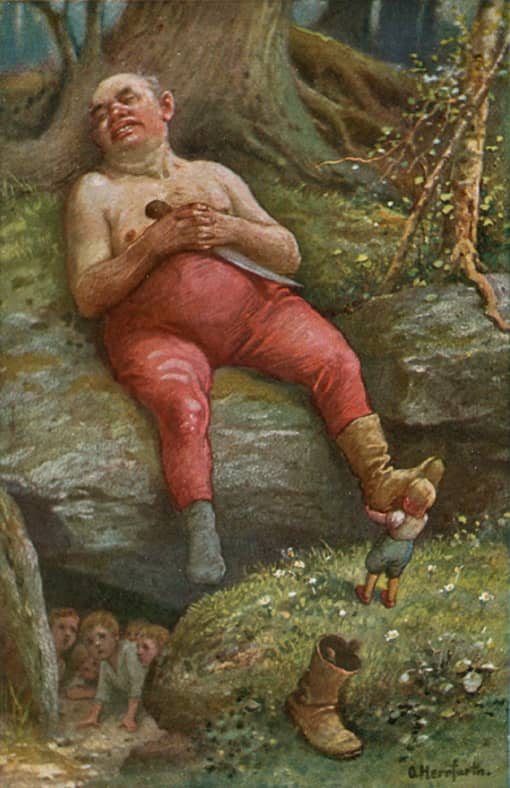
The Ogre, who found himself much tired with his long and fruitless journey (for these boots of seven leagues extremely fatigue the wearer), had a great mind to rest himself, and, by chance, went to sit down upon the rock where these little boys had hid themselves. As he was worn out, he fell asleep: and, after reposing himself some time he began to snore so frightfully, that the poor children were no less afraid of him, than when he held up his great knife, and was going to cut their throats.
Little Thumb was not so much frightened as his brothers, and told them that they should run away immediately towards home, while the Ogre was asleep so soundly; and that they should not be anxious about him. They took his advice, and got home presently. Little Thumb came up to the Ogre, pulled off his boots gently, and put them on upon his own legs. The boots were very long and large; but as they were Fairies, they had the gift of becoming big and little, according to the legs of those who wore them. So that they fitted his feet and legs as well as if they had been made on purpose for him.
He went immediately to the Ogre’s house, where he saw his wife crying bitterly for the loss of her murdered daughters. „Your husband,“ said Little Thumb, „is in very great danger, being taken by a gang of thieves, who have sworn to kill him, if he does not give them all his gold and silver. Just when they held their daggers at his throat, he perceived me, and desired me to come and tell you the condition he is in, and that you should give me whatsoever he has of value, without retaining any one thing. For otherwise they will kill him without mercy.
And, as his case is very pressing, he desired me to make use (you see I have them on) of his boots, that I might make the more haste, and to shew you that I do not impose upon you.“ The good woman, being sadly frightened, gave him all she had: for this Ogre was a very good husband, tho‘ he used to eat up little children. Little Thumb, having thus got all the Ogre’s money, came home to his father’s house, where he was received with abundance of joy. There are many people who do not agree in this circumstance, and pretend that Little Thumb never robbed the Ogre at all, and that he only thought he might very justly, and with safe conscience take off his boots of seven leagues, because he made no other use of them, but to run after little children.
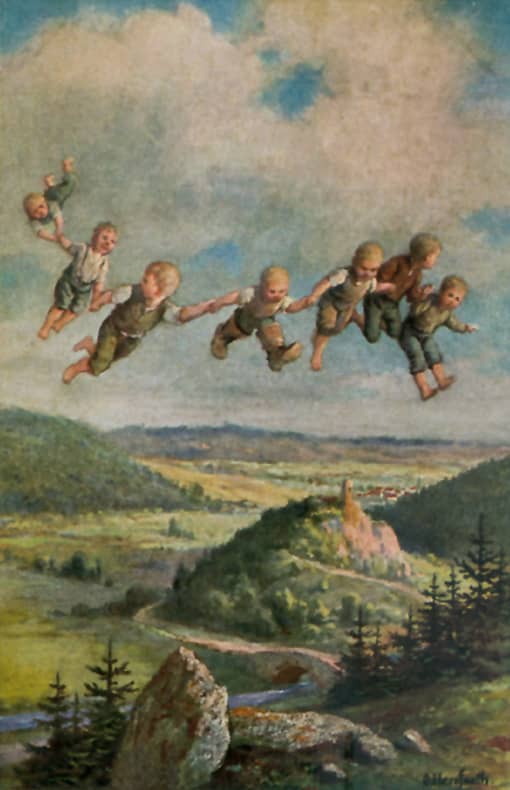
These folks affirm, that they were very well assured of this, and the more, as having drank and eaten often at the faggot-maker’s house. They aver, that, when Little Thumb had taken off the Ogre’s boots, he went to Court, where he was informed that they were very anxious about a certain army, which was two hundred leagues off, and the success of a battle. He went, say they, to the King, and told him that, if he desired it, he would bring him news from the army before night.
The King promised him a great sum of money upon that condition. Little Thumb was as good as his word, and returned that very same night with the news; and this first expedition causing him to be known, he got whatever he pleased. For the King paid him very well for carrying his orders to the army, and abundance of ladies gave him what he would to bring them news from their lovers; and that this was his greatest gain. There were some married women, too, who sent letters by him to their husbands, but they paid him so ill that it was not worth his while, and turned to such small account, that he scorned ever to reckon what he got that way.
After having, for some time, carried on the business of a messenger, and gained thereby great wealth, he went home to his father, where it was impossible to express the joy they were all in at his return. He made the whole family very well-to-do, bought places for his father and brothers; and by that means settled them very handsomely in the world, and, in the mean time, rose high in the King’s favour.
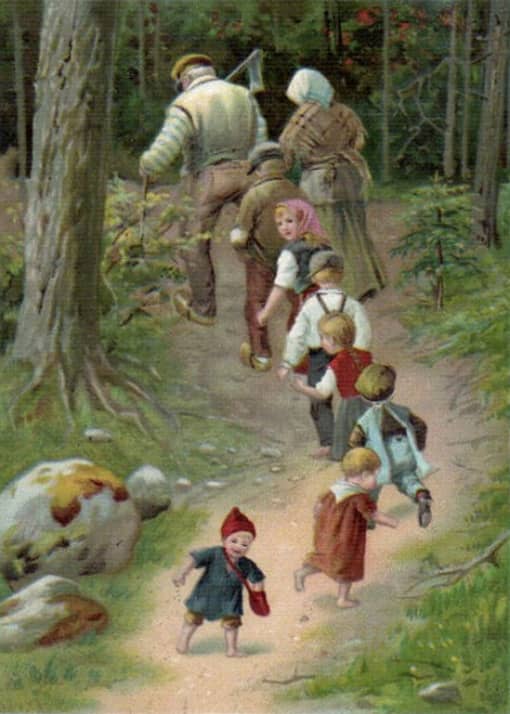
 Learn languages. Double-tap on a word.Learn languages in context with Childstories.org and Deepl.com.
Learn languages. Double-tap on a word.Learn languages in context with Childstories.org and Deepl.com.Backgrounds
Interpretations
Adaptions
Summary
Abstract
Linguistics
„Little Thumb“ (also known as „Hop-o‘-My-Thumb“ or „Le Petit Poucet“) is a French fairy tale written by Charles Perrault and first published in his 1697 collection, „Histoires ou contes du temps passé, avec des moralités“ (Stories or Tales of Past Times, with Morals). Perrault was a prominent French author who contributed significantly to the development of the literary fairy tale genre, with „Little Thumb“ being one of his most popular works.
The story of „Little Thumb“ is believed to have roots in European folktales, which often featured small characters with wit and resourcefulness overcoming their larger or more powerful adversaries. This theme is common in many oral traditions and can be seen in other fairy tales such as „Tom Thumb“ from England and „Thumbling“ from the Brothers Grimm.
Perrault’s „Little Thumb“ incorporates elements of the oral storytelling tradition, such as the use of repetition and simple narrative structure, which were characteristic of the fairy tale genre. The story also incorporates dark themes and moral lessons that were typical of Perrault’s works. By retelling and refining these folk stories, Perrault helped establish the literary fairy tale as an important genre in European literature.
„Little Thumb,“ written by Charles Perrault, is open to various interpretations, with themes of resourcefulness, family, and overcoming adversity being prominent throughout the story. Here are some interpretations:
Resourcefulness and Intelligence: Little Thumb is the smallest of seven brothers, but he is also the smartest and most resourceful. He uses his intelligence to save himself and his brothers from difficult situations, such as finding their way back home by leaving a trail of stones and later outwitting the ogre to save their lives. The story demonstrates the importance of using one’s wits and intelligence to overcome obstacles, even when physical strength is lacking.
Family: The tale emphasizes the importance of family bonds and unity. Little Thumb’s love for his brothers and his determination to protect them are central to the story. Despite their father’s decision to abandon the children in the woods, Little Thumb remains loyal to his family and works tirelessly to ensure their safety and reunite with their parents.
Overcoming Adversity: „Little Thumb“ highlights the theme of overcoming adversity and prevailing against all odds. Despite being small, poor, and seemingly insignificant, Little Thumb uses his resourcefulness and determination to overcome multiple challenges, including hunger, abandonment, and the threat posed by the ogre.
Moral Lessons: As with many of Perrault’s fairy tales, „Little Thumb“ offers moral lessons for readers. The tale shows the consequences of poor decision-making, as seen with the father’s decision to abandon his children in the woods, which leads to further hardship. Additionally, the story encourages readers to use their intelligence and creativity to solve problems, demonstrating that size and physical strength are not the only factors that determine success.
Overall, „Little Thumb“ is a classic fairy tale that showcases the importance of intelligence, resourcefulness, family bonds, and overcoming adversity, while also providing moral lessons for its readers.
„Little Thumb“ by Charles Perrault has inspired numerous adaptations across various forms of media. Some of these adaptations include.
Film and Television: „Le Petit Poucet“ (1972): A French film directed by Michel Boisrond, starring Jean-Claude Donda and André Reybaz. „Tom Thumb“ (1958): A British-American film directed by George Pal, inspired by both „Little Thumb“ and the English folk tale „Tom Thumb.“ The movie starred Russ Tamblyn, June Thorburn, and Peter Sellers. „Le Petit Poucet“ (2001): A French film directed by Olivier Dahan, featuring Elijah Wood as the narrator. „Le Petit Poucet“ (2009): A French TV film directed by Marina de Van, with a darker take on the fairy tale. Tom Thumb (1958 film): This movie adaptation of „Little Thumb“ stars Russ Tamblyn as Tom Thumb, and features songs by the Sherman Brothers. It follows Tom Thumb’s adventures as he outwits a series of dangerous foes, including an evil queen and a hungry giant. Thumbelina (1994 film): „Thumbelina“ is a loose adaptation of „Little Thumb“ that follows the adventures of a tiny girl who is no bigger than a thumb. The movie features an all-star voice cast, including Jodi Benson, Carol Channing, and John Hurt. The Adventures of Tom Thumb and Thumbelina (2002 film): This animated movie combines the stories of „Little Thumb“ and „Thumbelina“ into a single narrative. It follows Tom Thumb and Thumbelina as they team up to save their tiny kingdoms from destruction.
Literature: „The Great God Pan“ (1890): A novella by Arthur Machen, where the character Helen is compared to Little Thumb when she creates a trail of breadcrumbs. „The Complete Fairy Tales“ (1991) by Charles Perrault, translated by Neil Philip and Nicoletta Simborowski: This collection includes „Little Thumb“ alongside other classic Perrault tales. „Little Thumb“ has also inspired several picture books, retellings, and adaptations for children, often with variations in the plot or characters. Tom Thumb (children’s book): This retelling of „Little Thumb“ by Richard Johnson features colorful illustrations and simplified language that makes it accessible to young readers. It tells the story of Tom Thumb’s adventures in a fun and engaging way.
Theater and Ballet: „Petit Poucet“ (1911): A ballet choreographed by Michel Fokine for the Ballets Russes, with music by Maurice Ravel. Various theatrical adaptations and stage performances of „Little Thumb“ have been produced over the years, often as part of children’s theater or storytelling events. Little Thumb (2019 play): This stage adaptation of „Little Thumb“ features a script by Douglas Irvine and original music by Claire McKenzie. It follows the adventures of Little Thumb and his brothers as they journey through the woods and encounter a series of dangerous creatures.
Music: „Ma mère l’Oye“ (Mother Goose, 1910): A suite for piano by Maurice Ravel, which includes a movement titled „Petit Poucet“ inspired by the tale. These are just a few examples of how „Little Thumb“ has been adapted and reinterpreted across different media, demonstrating the lasting appeal and influence of this classic fairy tale.
Hop-o‘-My-Thumb has been adapted into various forms over the years, including ballets, novels, and animated films, showcasing its enduring popularity and cultural significance. Overall, „Little Thumb“ from Charles Perrault has been adapted in various forms over the years, each one bringing its own unique perspective to the classic tale.
„Little Thumb“ is a fairy tale by Charles Perrault about a boy who is the smallest of seven brothers but possesses remarkable intelligence and resourcefulness. In the story, a poor woodcutter and his wife decide to abandon their children in the forest because they cannot provide enough food for the family. Little Thumb, overhearing their parents‘ plan, gathers small white stones to leave a trail that will guide them back home.
When the woodcutter and his wife abandon the children in the forest, Little Thumb’s trail of stones leads them back home safely. However, their situation remains dire, and the parents decide to abandon the children once more. This time, Little Thumb attempts to gather stones but cannot, so he instead uses breadcrumbs to mark the path. Unfortunately, birds eat the crumbs, leaving the children lost in the woods.
As the children wander, they come across a house inhabited by an ogre and his wife. The ogre’s wife takes pity on the children and hides them, but the ogre discovers them and decides to eat them. Little Thumb, using his cleverness, switches the ogre’s daughters‘ nightcaps with his brothers‘ caps while they sleep. The ogre, unable to see clearly in the dark, kills his daughters instead of the brothers.
The ogre’s wife helps the children escape, and Little Thumb steals the ogre’s magical boots that allow him to travel great distances instantly. He uses the boots to run errands for a wealthy man, who rewards him with a fortune. Little Thumb returns to his family with the newfound wealth, and they all live comfortably and happily ever after.
Hop-o‘-My-Thumb, also known as Little Thumbling, Little Thumb, or Little Poucet, is a fairytale published by Charles Perrault in 1697. It tells the story of Hop-o‘-My-Thumb, the youngest of seven children in a poor woodcutter’s family, who uses his intelligence to save himself and his brothers from various perils, including an ogre. The story’s beginning states that the protagonist was no bigger than a man’s thumb at birth. However, throughout the rest of the tale, he is portrayed as a small child with no connection to Tom Thumb. The introduction might be a remnant from an older tale that shares ancestry with both Hop-o‘-My-Thumb and Tom Thumb.
The plot revolves around a woodcutter and his wife, who decide to abandon their children in the forest due to poverty. Hop-o‘-My-Thumb overhears this plan and collects pebbles to mark a trail back home. After being abandoned again, Hop-o‘-My-Thumb and his brothers find themselves lost in the woods. They come across an ogre’s house and decide to stay there, despite the danger.
Hop-o‘-My-Thumb outsmarts the ogre by switching his and his brothers‘ bonnets with the ogre’s daughters‘ gold crowns, causing the ogre to kill his daughters instead. The boys escape, and Hop-o‘-My-Thumb steals the ogre’s magical seven-league boots, which he uses to make a fortune and provide for his family. The French folktale was first published in English in 1729 as Little Poucet. The story has been adapted into various forms, including ballets, novels, and animated films.
Hop-o‘-My-Thumb, originally published as Le petit Poucet, was included in his 1697 book, Histoires ou contes du temps passé. The name „Poucet“ is derived from the French word „pouce,“ meaning „thumb,“ „big toe,“ or „inch.“ The addition of the „-t“ suffix gives it an affectionate touch. The story shares similarities with Hansel and Gretel and Tom Thumb. The first half of Hop-o‘-My-Thumb shares similarities with the story of Hansel and Gretel. In both tales, the woodcutter parents are unable to support their children and abandon them in the woods. The hero lays a trail of breadcrumbs that ultimately fails due to birds eating the breadcrumbs. This theme of laying a trail is present in other stories, such as Theseus and the Minotaur.
The fairy tale „Little Thumb“ by Charles Perrault offers rich material for linguistic analysis, particularly due to its use of language, narrative techniques, and character development. Here is a breakdown of some key linguistic aspects of the tale:
Narrative Style: The story is told in a third-person omniscient perspective, which allows the narrator to offer insights into the characters‘ thoughts and motivations. This style is typical of fairy tales, providing an authoritative voice that guides the reader through the story.
Lexical Choices: The tale employs a mix of simple and archaic language, which reflects its historical origins. Words like „faggot-maker“ (referring to someone who makes bundles of sticks), „puny,“ and „incommoded“ may appear outdated to modern readers but contribute to the period setting of the tale.
Characterization: The characters in „Little Thumb“ are defined by their actions and attributes rather than detailed psychological descriptions. Little Thumb is depicted as clever and resourceful, traits emphasized by his actions rather than direct description. The Ogre, on the other hand, is described with vivid details, highlighting his ferocity and monstrous nature.
Dialogue: The dialogue in the story often serves to reveal character relationships and advance the plot. For example, the exchange between Little Thumb and the Ogre’s wife showcases his cunning, while the dialogue between the faggot-maker and his wife highlights their desperation and moral conflict.
Symbolism and Themes: The tale uses recurring motifs such as abandonment, cleverness, and survival. The white pebbles and breadcrumbs symbolize Little Thumb’s foresight and strategic thinking, while the Ogre represents a primal threat to the children, embodying fears of cannibalism and the unknown.
Moral Lessons: Like many fairy tales, „Little Thumb“ imparts moral lessons, particularly about the virtue of intelligence and perseverance over brute strength. Little Thumb’s success is attributed to his cleverness and ability to adapt to challenging circumstances.
Linguistic Devices: Perrault uses various linguistic devices to enhance the narrative, including repetition („Here we are, here we are“ when the children return), contrasts (the Ogre’s monstrous appearance versus Little Thumb’s small stature), and vivid imagery (descriptions of the Ogre’s daughters and the dark forest).
Overall, „Little Thumb“ combines traditional fairy tale elements with linguistic techniques to create a story that is both entertaining and instructive, emphasizing themes of wit, survival, and the triumph of cleverness over adversity.
Information for scientific analysis
Fairy tale statistics | Value |
|---|---|
| Translations | DE, EN, EL |
| Readability Index by Björnsson | 32 |
| Flesch-Reading-Ease Index | 77.2 |
| Flesch–Kincaid Grade-Level | 7.9 |
| Gunning Fog Index | 10.1 |
| Coleman–Liau Index | 8 |
| SMOG Index | 8.3 |
| Automated Readability Index | 8.5 |
| Character Count | 19.688 |
| Letter Count | 15.165 |
| Sentence Count | 173 |
| Word Count | 3.748 |
| Average Words per Sentence | 21,66 |
| Words with more than 6 letters | 386 |
| Percentage of long words | 10.3% |
| Number of Syllables | 4.769 |
| Average Syllables per Word | 1,27 |
| Words with three Syllables | 135 |
| Percentage Words with three Syllables | 3.6% |
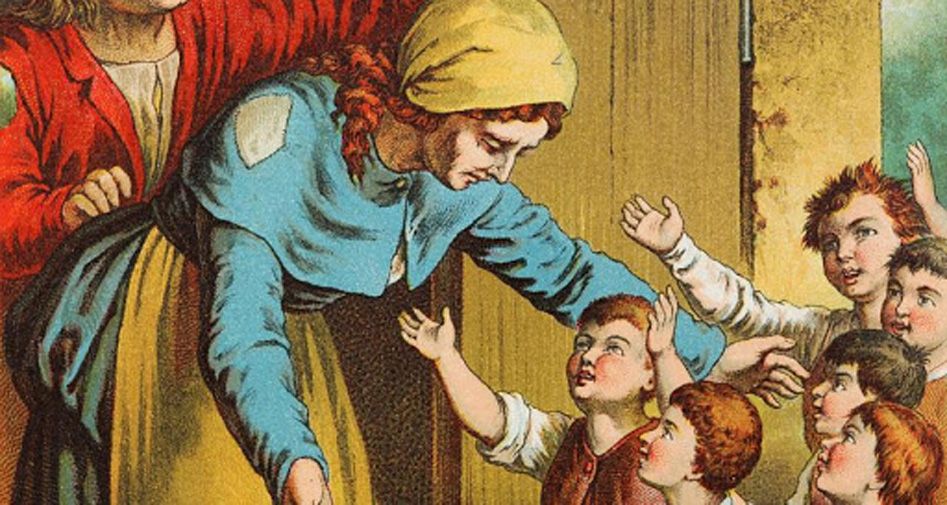
 Facebook
Facebook  Whatsapp
Whatsapp  Messenger
Messenger  Telegram
Telegram Reddit
Reddit